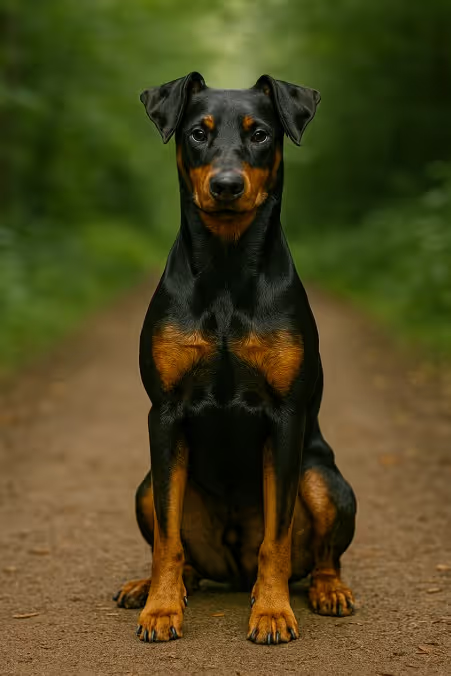The German Pinscher is a medium-sized, spirited, and elegant dog known for its intelligence, alertness, and fearless personality. Often described as a watchdog with a heart of gold, this breed excels as both a vigilant protector and an affectionate family companion. Ideal for experienced dog owners, the German Pinscher thrives in active households that provide consistent training, structure, and mental stimulation.

Originating in Germany in the 19th century, the German Pinscher was developed as a versatile farm dog responsible for guarding property and controlling vermin. It is one of the foundation breeds behind both the Doberman Pinscher and Miniature Pinscher. After near extinction following World War II, the breed was revived by dedicated breeders and remains relatively rare but admired for its sharp instincts and lively nature.
Compact, sleek, and muscular with a confident stance and expressive face.
Low-maintenance coat, but routine care is still essential.
Energetic and athletic, the German Pinscher needs regular physical and mental activity.
Highly intelligent but independent—requires consistency and firm leadership.
Feed a balanced diet tailored to this breed’s high energy and lean muscle.
Generally a healthy and robust breed, but a few conditions may occur.
Due to rarity, locating a German Pinscher may require patience and research.
Are German Pinschers good family dogs?
Yes—with proper training and early socialization, they are loyal, protective, and playful.
Do German Pinschers bark a lot?
Moderately. They are alert watchdogs and will bark to signal activity or strangers.
Are German Pinschers hypoallergenic?
No. While they shed less than many breeds, they are not considered hypoallergenic.
Can German Pinschers live in apartments?
Yes—if exercised well and mentally stimulated, they can adapt to apartment living.
Do German Pinschers get along with other pets?
They can, with early socialization, though they may have a high prey drive toward small animals.
Are German Pinschers aggressive?
Not inherently. They are protective and assertive but not aggressive with responsible ownership.
How much exercise does a German Pinscher need?
At least 60–90 minutes daily, including walks and interactive play.
Do German Pinschers shed?
Yes, but minimally. Weekly brushing helps manage the short coat.